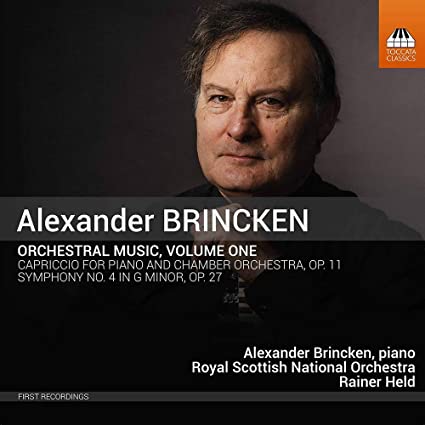

Symphony No. 4 in G Minor, Op. 27 (2015) Capriccio for Piano and Chamber Orchestra, Op. 11 (1985)
When I first heard this recording of orchestral works by Russian-born Swiss composer Alexander Brincken (b. 1952) it was a revelation to me. I was expecting to hear, based on his birthdate and nationality, something quite a bit more modern in sound and style. But to my astonished surprise his orchestral writing, especially his Symphony No. 4, sounds closer to music conceived by a composer born in 1852. His thematic material, pacing, deployment and orchestration actually hearkens back to some of the big guns from that era like Anton Bruckner, Hans Rott and Gustav Mahler. Although his Russian roots are exposed within the Capriccio, which is really a Concerto for Piano and Orchestra except by name, wherein the piano part in particular is more redolent of the sound world of Sergei Rachmaninov and even more so late stage Alexander Scriabin.
In the booklet notes Brincken himself explains his proclivity for late 19th century Central European romanticism: "I was trained at the elite musical establishment of Leningrad, the Special Music School of the Leningrad Conservatoire, where I mostly studied works of Baroque, Classical and Romantic German masters from Bach through the Viennese classics up to Schumann and Brahms. The only exception was familiarity with Rachmaninov's music. My musical development was heavily influenced by regular visits in the 1960s and '70s to the Leningrad Philharmonic, where Bruckner symphonies and Richard Strauss tone-poems made a formative impression. I must also mention two shattering experiences in the late 1960s: a visit by Herbert von Karajan with the Berlin Philharmonic in a Beethoven programme, and the performance of Bach's B minor Mass by the Munich Bach Ensemble under Karl Richter. These determining impressions reinforced the Germanophile focus of my musical tastes."
But his music is more than just the regurgitation of pre-established Romantic gestures. His strength lies in his orchestration skills and solid development abilities. A prime example of this is highly apparent in the opening pages of the symphony in which, over a period of more than four minutes, he builds up a simple motif to high levels of tension and power. And here and there in the undercurrent of the faster movements, I can barely catch a whiff of an older Swiss composer, Arthur Honegger. And in some of the more cyclical, motoristic passages, a certain level of formulaic repetition sets in that brings to mind some of the music of Polish composer Andrzej Panufnik.
And best of all, as you can hear in the short audio clip below, his motifs, melodic ideas or themes can be alluringly captivating. The audio recording itself is first rate, and the Royal Scottish National Orchestra under the direction of conductor Rainer Held bring out this music's appeal as if an established crowd-pleaser. So if you are like me, always living in the past (musically speaking), I can't but recommend Alexander Brincken's music enough. Can't wait to see what Volume 2 will have in store for us.
Jean-Yves Duperron - April 2021